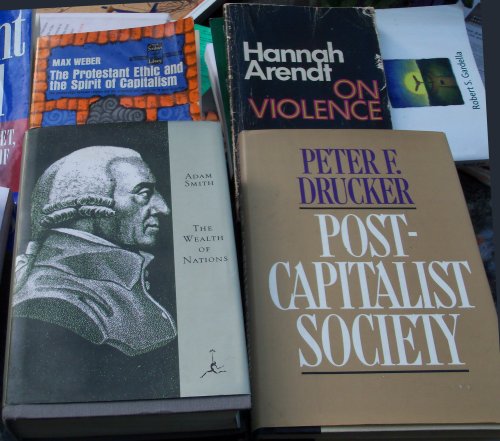Many media outlets continue to portray the OWS agenda as vague, despite the highly specific demands on protestors' placards. The book "lending library" at the Occupy San Francisco encampment in front of the Federal Reserve building on Market Street gives the lie to that spin.

November 17, 2011, 3:34pm, Occupy San Francisco camp at Federal Reserve building.
Clockwise from lower left: The Wealth of Nations, Adam Smith; The Protestant Ethic and the Spirit of Capitalism, Max Weber; On Violence, Hannah Arendt; Post-Capitalist Society, Peter Drucker.
These books were not placed for the benefit of the media; I found them sandwiched between two tents in a stack, and extracted these four out of a dozen more books on economy and social dynamics (along with a couple of novels).
Nor were the books there in the hope that protestors would absorb the thoughts by osmosis. Having read Weber, Arendt, Drucker, and some of Smith, in my conversations with protestors I was repeatedly startled as they reminded me of parts I'd forgotten. The protesters know their subject, and their issues (not just in San Francisco, but likewise in Oakland across the bay).
There's a progression to the thinking in these books: Smith and his original vision of capitalism; Weber writing 130 years later from a different perspective on how capitalism had evolved; and Drucker speculating on where it is going (or how it will be gone).
The seemingly out-of-place book is Arendt's On Violence. While Arendt is best known for her comment on "the banality of evil," what she brought to modern attention in On Violence was that violence and power are diametrically opposed: that of all the kinds of power -- adulation, prestige, fear, or simply peoples' need for food -- violence is in the long run the least efficient -- that in fact violence is the admission that more efficient power forms of power have failed.
This is because violence is expensive (e.g., the assault on Iraq), it interferes with the productivity of the peasants (we the 99%), and in the long run is the most likely to bring retribution from the peasants.
Arendt's observation on the contrast between efficient power and violence, written in the aftermath of WWII, remains indisputable today. NATO and its allies recently attacked Libya with jet strikes and Tomahawk missiles precisely because they had no political power over the Gaddafi regime.
Today police are using violence against largely non-violent protestors because the politicians have no other form of power over the protestors. This is precisely how moderately confrontational Vietnam era protests turned into full-scale riots -- by the police indiscriminately attacking all protestors (along with non-participants and media).
In the end the American public lost confidence in the Establishment, and the war was lost on the American front even before it was lost in Vietnam. (The Federal Walker Report summary of the 1968 Chicago anti-Vietnam protests and the ensuing "police riot" is -- but for scale -- uncomfortably close to a description of the NYPD's behavior in recent weeks.)
On Violence was the one book I was surprised to find in the lending library on Market Street in San Francisco.
It was also one more indicator that the protestors are thinking ahead of the Establishment -- sometimes only by hours, but more often by months and years.
###
Arendt actually leaned so far as to opine that violence shows the complete absence of power, or at most is an "artificial power" -- but no one who has been tear-gassed or clubbed would be likely to go that far.
From Wikipedia, a well-written synopsis: "Arendt's essay "On Violence" distinguishes between the concepts of violence and power. Arendt maintains that although theorists of both the left and right regard violence as an extreme manifestation of power, the two concepts are in fact antithetical. Power comes from the collective will and does not need violence to achieve any of its goals since voluntary compliance takes its place. As governments start losing their legitimacy, violence becomes an artificial means towards the same ends and is therefore found only in the absence of Power."
This Blogger's Books
by Nicholas Carroll